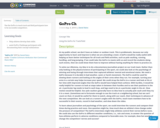
Use the GoPro to teach track and field participants how to be successful competitors.
- Subject:
- Arts and Humanities
- Social Science
- Material Type:
- Assessment
- Case Study
- Interactive
- Date Added:
- 03/11/2014

Use the GoPro to teach track and field participants how to be successful competitors.

Mayer, Warner, Siedel and Lieberman's Government Regulation and the Legal Environment of Business is an up-to-date textbook that covers legal issues that students must understand in today's highly regulated business environment. The text is organized to permit instructors to tailor the materials to their particular approach. The authors take special care to engage students by relating law to everyday events with their clear, concise and readable style.
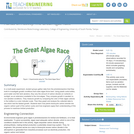
In a multi-week experiment, student groups gather data from the photobioreactors that they build to investigate growth conditions that make algae thrive best. Using plastic soda bottles, pond water and fish tank aerators, they vary the amount of carbon dioxide (or nutrients or sunlight, as an extension) available to the microalgae. They compare growth in aerated vs. non-aerated conditions. They measure growth by comparing the color of their algae cultures in the bottles to a color indicator scale. Then they graph and analyze the collected data to see which had the fastest growth. Students learn how plants biorecycle carbon dioxide into organic carbon (part of the carbon cycle) and how engineers apply their understanding of this process to maximize biofuel production.
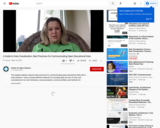
This applied webinar explores best practices for communicating open educational data with a wide audience. Topics include different methods for encoding data, the use of color and considerations for color blindness, visual perception, common pitfalls, and methods for minimizing cognitive load. Dr. Daniel Anderson, from the University of Oregon, guides the audience through these topics, while also briefly discussing mediums for communication, including data dashboards to reach a larger and more diverse audience.
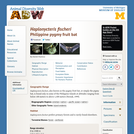
Haplonycteris fischeri: Information

Introduces a comprehensive overview of wellness concepts including fitness, nutrition, stress, disease prevention, and various other lifestyle factors that improve the quality of life. Each student's health and fitness is individually evaluated through a series of tests measuring cardiovascular endurance, strength, body composition, flexibility, blood pressure, nutrition, stress levels and blood lipid and blood glucose.

Strategies for Math
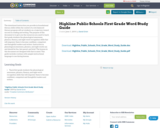
The intentional instruction you provide in foundational literacy skills within the context of a rich balanced literacy program will set students on a trajectory toward success in reading and writing. The purpose of this document is to give you the resources you need to teach first grade students the phonological awareness, phonics, fluency, and sight-word-recognition skills that will empower them to become confident, competent and thoughtful readers and writers. Instruction in phonological awareness, phonics, and sight words can and should be fun, fast-paced, and brief. The lessons in this document are designed with that in mind. This guide includes routines with sample instructional language to use during lessons
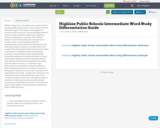
While we hope that most students have mastered basic decoding skills by grade three, some students will need additional support. The purpose of this guide is to provide resources for you to assess and differentiate for students’ needs in phonics, sight word recognition, fluency, and phonemic awareness. This will help students to meet the foundational standards in the Common Core, to meet reading standard 10 (independently read complex text at grade level), and most importantly, to become successful readers and scholars. The primary goal of the instructional activities in this guide is to support students in developing proficiency and automaticity with decoding skills. Decoding (reading) and encoding (writing) are closely related skills, and the activities in this guide address both. Because of the pivotal and primary role reading plays in academic success, you will want to pay particularly close attention to students’ proficiency with decoding and fluency.
As a teacher of students in third grade or beyond, you won’t want to provide whole-class phonics instruction – though more advanced word study such as word analysis should be a part of your curriculum. Rather, you’ll want to identify the needs of individual students and meet those needs through small group and individual instruction. This is because many of your students will already have mastered the phonics skills they need.
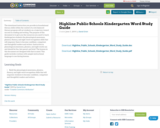
The intentional instruction you provide in foundational literacy skills within the context of a rich balanced literacy program will set students on a trajectory toward success in reading and writing. The purpose of this document is to give you the resources you need to teach kindergarten students the phonological awareness, phonics, fluency, and sight-word-recognition skills that will empower them to become confident, competent and thoughtful readers and writers. Instruction in phonological awareness, phonics, and sight words can and should be fun, fast-paced, and brief. The lessons in this document are designed with that in mind. This guide includes routines with sample instructional language to use during lessons.
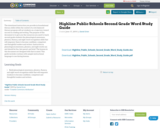
The intentional instruction you provide in foundational literacy skills within the context of a rich balanced literacy program will set students on a trajectory toward success in reading and writing. The purpose of this document is to give you the resources you need to teach second grade students the phonological awareness, phonics, fluency, and sight-word-recognition skills that will empower them to become confident, competent and thoughtful readers and writers. Instruction in phonological awareness, phonics, and sight words can and should be fun, fast-paced, and brief. The lessons in this document are designed with that in mind. This guide includes routines with sample instructional language to use during lessons.
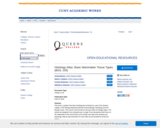
This book is a guide to the basic histology lab conducted as a part of the Queens College, CUNY Biology Department Bio105 General Biology: Physiology and Cell Biology course. This course is the first half our two-part series for biology majors. The actives are designed to be conducted over a single 3-hour lab periods which focus on the relationship of form and function of the cellular and organ level anatomy and physiology. Step by step instructions for each slide set are provided for all the key organs.
In addition to the full text of the book, we also provide a checklist form with just the assessment portions of the book. This is to help summarize all the information the student should get from the activity.
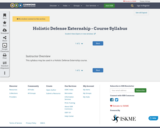
This syllabus may be used in a Holistic Defense Externship course.
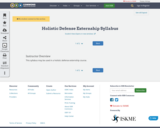
This syllabus may be used in a holistic defense externship course.
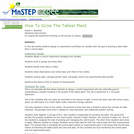
This is an activity where students learn about inquiry by designing an experiment on bean plants with the goal of growing the tallest plant. Students work in groups to plan the growing conditions of the control and three experimental plants. Students collect data for about three weeks and analyze their data to see if their hypothesis is correct or not. The end product can be a report presented in a number of ways.
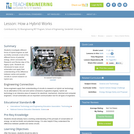
Students investigate different forms of hybrid engines as well as briefly conclude a look at the different forms of potential energy, which concludes the Research and Revise step of the legacy cycle. Students are introduced to basic circuit schematics and apply their understanding of the difference between series and parallel circuits to current research on hybrid cars.

In scholarly writing, it is important to structure a paper in a manner that is concise and follows the general format set by writing professionals. The American Phycological Association (APA) format of writing is widely accepted and a good rule of thumb to follow when writing formal papers. This resource was constructed to give the basics of the newest APA 7th edition. Additional research will be needed for more specific situations and citations

This resource provides references, writing aids and guides for students writing essays in a literature-based composition course. These materials were culled from several different sites; the individual pages link back to the original resource and indicate the Creative Commons license under which the page is adapted and/or reused. Except where otherwise noted, this resource is licensed under CC BY-NC-SA.
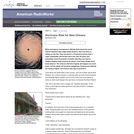
This transcribed article from American Radio Works discusses the hurricane risk in New Orleans. The 2002 article talks about how deep flood waters would be in a Category Five hurricane and the likelihood that such a storm would hit. Users may also listen to the article using Real Player audio program.
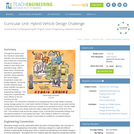
Through four lessons and four hands-on associated activities, this unit provides a way to teach the overarching concept of energy as it relates to both kinetic and potential energy. Within these topics, students are exposed to gravitational potential, spring potential, the Carnot engine, temperature scales and simple magnets. During the module, students apply these scientific concepts to solve the following engineering challenge: "The rising price of gasoline has many effects on the US economy and the environment. You have been contracted by an engineering firm to help design a physical energy storage system for a new hybrid vehicle for Nissan. How would you go about solving this problem? What information would you consider to be important to know? You will create a small prototype of your design idea and make a sales pitch to Nissan at the end of the unit." This module is built around the Legacy Cycle, a format that incorporates findings from educational research on how people best learn. This module is written for a first-year algebra-based physics class, though it could easily be modified for conceptual physics.